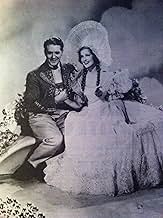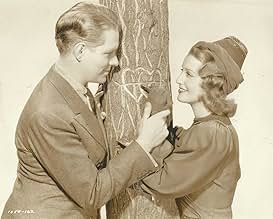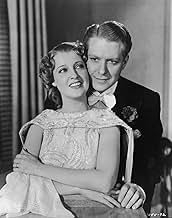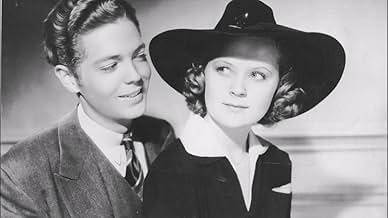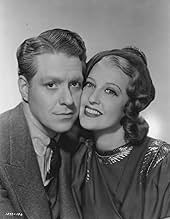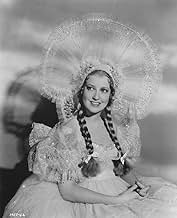AVALIAÇÃO DA IMDb
6,2/10
764
SUA AVALIAÇÃO
Adicionar um enredo no seu idiomaThe team behind a successful Broadway production tries to stop the married stars from transitioning to Hollywood.The team behind a successful Broadway production tries to stop the married stars from transitioning to Hollywood.The team behind a successful Broadway production tries to stop the married stars from transitioning to Hollywood.
- Direção
- Roteiristas
- Artistas
- Indicado a 2 Oscars
- 5 vitórias e 2 indicações no total
Avaliações em destaque
Sweethearts was the first color film for Nelson & Jeanette, and they, and the film are quite beautiful.They portray a married couple, appearing in musical comedy. This shows Nelson at his most playful--the "Pretty as A Picture" duet was so personal, I thought I was privy to a private moment between them. Too bad, MGM never took advantage of Nelson's self depreciating talent, but this film is most interesting, because it gives us a fascinating glimpse of what might have been.
MGM spared no expense in dressing up the sets and costumes for an opulent technicolor musical starring America's singing sweethearts, Jeanette MacDonald and Nelson Eddy. They even included a witty script by Dorothy Parker, songs by Victor Herbert and a supporting cast that included Frank Morgan, Ray Bolger, Reginald Gardiner and Allyn Joslyn. But changing tastes have made this one questionable material for today's audiences.
This time the stars are not in period costumes. The story is a contemporary one about two stage stars tired of appearing for the sixth straight year on Broadway in a musical called "Sweethearts" who decide to give Hollywood a try. Plot complications occur when blustery Frank Morgan uses trickery to make Jeanette believe Nelson is cheating on her. Everything is straightened out for a happy ending that reunites the two stars and has them both returning to the Broadway scene where their hearts truly lie.
Fans of the famous duo will undoubtedly enjoy this one, but today's movie fans are likely to be put off by much of the humor. Acting styles and singing tastes have changed drastically since 1938. The stars are in fine voice but the songs are not among Herbert's best and, while there are a few amusing moments, the film has a very dated quality both in story and acting that makes it sometimes seem like an unpleasant pill to swallow.
This is true even though both stars are photographed to advantage and are still at their physical peak here--but as a musical, despite the technicolor trimmings, it falls short of being a real winner.
This time the stars are not in period costumes. The story is a contemporary one about two stage stars tired of appearing for the sixth straight year on Broadway in a musical called "Sweethearts" who decide to give Hollywood a try. Plot complications occur when blustery Frank Morgan uses trickery to make Jeanette believe Nelson is cheating on her. Everything is straightened out for a happy ending that reunites the two stars and has them both returning to the Broadway scene where their hearts truly lie.
Fans of the famous duo will undoubtedly enjoy this one, but today's movie fans are likely to be put off by much of the humor. Acting styles and singing tastes have changed drastically since 1938. The stars are in fine voice but the songs are not among Herbert's best and, while there are a few amusing moments, the film has a very dated quality both in story and acting that makes it sometimes seem like an unpleasant pill to swallow.
This is true even though both stars are photographed to advantage and are still at their physical peak here--but as a musical, despite the technicolor trimmings, it falls short of being a real winner.
While there films are not nearly so popular today, Jeanette MacDonald and Nelson Eddy were incredibly hot properties for MGM and this would explain why MGM made "Sweethearts" in full Technicolor...something they'd never done with a full length film. Many studios had made films using cheaper (and inferior) color stock such as Two-Color Technicolor and the new, improved full color from Technicolor was expensive and MGM pulled out all the stops for their big team.
MacDonald and Eddy play Gwen Marlowe and Ernest Lane, a pair of Broadway stars who have been packing theaters for years with their latest show, "Sweethearts". Not surprisingly, Hollywood comes knocking...and Marlowe and Lane's handlers do their best to try to hold on to them and prevent their defection to the West Coast.
As you watch this, you might think that the Technicolor is a bit garish and intense. This was often the case with early Technicolor...partly because of the film process and partly because its inventor insisted that his ex-wife, Natalie Kalmus, be the color consultant...and she determined the colors of the costumes, sets and the like. And, of the stars, MacDonald comes off the worst because she appears so incredibly ruddy in the film....and rather unnatural.
As you'd expect in one of their films, there is a LOT of singing...intense singing and big stage production numbers. This is the style of their films...a style which seemed to grow less and less popular into the 1940s and 50s. You either like it or you don't. As for the rest of the story, it's enjoyable and well made. I didn't mind the story at first, but found it really tanked when MacDonald's character changed...becoming rather demanding and nasty and VERY jealous. This was NOT a welcome story element. I also found the musical numbers difficult to enjoy because it's a style I've never been all that fond of seeing and hearing in films.
MacDonald and Eddy play Gwen Marlowe and Ernest Lane, a pair of Broadway stars who have been packing theaters for years with their latest show, "Sweethearts". Not surprisingly, Hollywood comes knocking...and Marlowe and Lane's handlers do their best to try to hold on to them and prevent their defection to the West Coast.
As you watch this, you might think that the Technicolor is a bit garish and intense. This was often the case with early Technicolor...partly because of the film process and partly because its inventor insisted that his ex-wife, Natalie Kalmus, be the color consultant...and she determined the colors of the costumes, sets and the like. And, of the stars, MacDonald comes off the worst because she appears so incredibly ruddy in the film....and rather unnatural.
As you'd expect in one of their films, there is a LOT of singing...intense singing and big stage production numbers. This is the style of their films...a style which seemed to grow less and less popular into the 1940s and 50s. You either like it or you don't. As for the rest of the story, it's enjoyable and well made. I didn't mind the story at first, but found it really tanked when MacDonald's character changed...becoming rather demanding and nasty and VERY jealous. This was NOT a welcome story element. I also found the musical numbers difficult to enjoy because it's a style I've never been all that fond of seeing and hearing in films.
Sweethearts is the first of two of the Jeanette MacDonald/Nelson Eddy films to be done in technicolor, the second at last being Bittersweet. It is also the first MGM film done in modern technicolor, though in Jeanette's The Cat and the Fiddle, the last 10 minutes were in color. And it is the only one of their films besides Bittersweet where they start off as man and wife.
The original operetta by Victor Herbert was done in 1913 and it was in fact a story set in Holland as the numbers do show. But this film is like the later one Nelson did with Rise Stevens, The Chocolate Soldier, in that he and Stevens are husband and wife appearing in The Chocolate Soldier while the plot of that is taken from Ferenc Molnar's The Guardsman.
Sweethearts has an original script by Dorothy Parker and it involves two happily married singing co-stars of a long running operetta, named Sweethearts. They've been appearing on Broadway for seven years in the same show.
In fact a whole cottage industry has grown up around Sweethearts. Producer Frank Morgan, songwriter Herman Bing, librettist Mischa Auer have had it real good for seven years. They've been quite content to live off the box office of Sweethearts as long as MacDonald and Eddy keep appearing. Also the extended families of both Eddy and MacDonald live off of them as well.
When Reginald Gardiner woos them on behalf of Hollywood producer George Barbier, panic ensues among the ranks of the cottage industry. These people might actually have to go to work.
Knowing Dorothy Parker wrote 50% of the script, you can imagine it is a witty one. Jeanette and Nelson are in good voice and the musical calls for a large number of duets. They sing the title song, For Every Lover Meets His Fate, and an interpolated non Victor Herbert song, Our Little Grey Home in the West in anticipation of their California excursion. In addition Jeanette sings A Summer Serenade which was originally an instrumental Victor Herbert composition entitled Badinage. Robert Wright and Chet Forrest gave it some lyrics for the film. Nelson has a good typical Nelson marching song in On Parade.
After appearing with Nelson Eddy in Rosalie as a sidekick Ray Bolger didn't have as many scenes, but got to show his dancing talent a lot more in the Wooden Shoes number. Jeanette personally interceded with Louis B. Mayer and got Douglas MacPhail and Betty Jaynes cast as their understudies.
MacPhail and Jaynes married later on, but divorced after MacPhail's career took a nosedive in the early Forties. He was a good singer who you might remember appeared with Mickey Rooney and Judy Garland in Babes in Arms and later introduced the Cole Porter classic, I Concentrate on You in Broadway Melody of 1940. Tragically he took his own life after the divorce for God only knows what reasons.
For Jeanette and Nelson fans and for those who like to see Ray Bolger in something else besides The Wizard of Oz, Sweethearts in highly recommended.
The original operetta by Victor Herbert was done in 1913 and it was in fact a story set in Holland as the numbers do show. But this film is like the later one Nelson did with Rise Stevens, The Chocolate Soldier, in that he and Stevens are husband and wife appearing in The Chocolate Soldier while the plot of that is taken from Ferenc Molnar's The Guardsman.
Sweethearts has an original script by Dorothy Parker and it involves two happily married singing co-stars of a long running operetta, named Sweethearts. They've been appearing on Broadway for seven years in the same show.
In fact a whole cottage industry has grown up around Sweethearts. Producer Frank Morgan, songwriter Herman Bing, librettist Mischa Auer have had it real good for seven years. They've been quite content to live off the box office of Sweethearts as long as MacDonald and Eddy keep appearing. Also the extended families of both Eddy and MacDonald live off of them as well.
When Reginald Gardiner woos them on behalf of Hollywood producer George Barbier, panic ensues among the ranks of the cottage industry. These people might actually have to go to work.
Knowing Dorothy Parker wrote 50% of the script, you can imagine it is a witty one. Jeanette and Nelson are in good voice and the musical calls for a large number of duets. They sing the title song, For Every Lover Meets His Fate, and an interpolated non Victor Herbert song, Our Little Grey Home in the West in anticipation of their California excursion. In addition Jeanette sings A Summer Serenade which was originally an instrumental Victor Herbert composition entitled Badinage. Robert Wright and Chet Forrest gave it some lyrics for the film. Nelson has a good typical Nelson marching song in On Parade.
After appearing with Nelson Eddy in Rosalie as a sidekick Ray Bolger didn't have as many scenes, but got to show his dancing talent a lot more in the Wooden Shoes number. Jeanette personally interceded with Louis B. Mayer and got Douglas MacPhail and Betty Jaynes cast as their understudies.
MacPhail and Jaynes married later on, but divorced after MacPhail's career took a nosedive in the early Forties. He was a good singer who you might remember appeared with Mickey Rooney and Judy Garland in Babes in Arms and later introduced the Cole Porter classic, I Concentrate on You in Broadway Melody of 1940. Tragically he took his own life after the divorce for God only knows what reasons.
For Jeanette and Nelson fans and for those who like to see Ray Bolger in something else besides The Wizard of Oz, Sweethearts in highly recommended.
This one is notable for being MGM's first Technicolor movie. "Sweethearts" won cinematographers Oliver Marsh and Allan Davey special Oscars for their work with color film. MacDonald looks gorgeous--black and white didn't do her justice.
The music is pleasant enough, but not memorable. The couple is nauseatingly in love through the first hour, starring in a long running Broadway production - "Sweethearts". Unable to find rest during their six year production, the two are enticed to go to Hollywood instead, being promised lots of breaks between films. The normally feuding creative forces/producers of "Sweethearts" realize that this is the end of the gravy train, so they hatch a plan to keep the two from leaving. Complications ensue.
When MacDonald and Eddy aren't singing, the film seems endless. Not even the scenes with animals make this amusing. Eddy is the one who brings off some sight gags--three of them to be exact. Frank Morgan and the rest of the cast are stranded without any funny lines. They just made me groan--and I'm an easy laugher. It's hard to make Frank Morgan unfunny.
Trivia I noticed--the opening operetta is on the same set that "The Great Ziegfeld" (1936) used for the "A Pretty Girl Is Like A Melody" number. There is a lengthy end credit explaining that the actors on the screen didn't write the 1913 operetta "Sweethearts". MacDonald has a five minute fashion show and proves she looks good in any outfit, no matter how misguided.
If you see this, watch the first thirty minutes and the fashion show for the cinematographers playing with colors, then fast forward between songs.
The music is pleasant enough, but not memorable. The couple is nauseatingly in love through the first hour, starring in a long running Broadway production - "Sweethearts". Unable to find rest during their six year production, the two are enticed to go to Hollywood instead, being promised lots of breaks between films. The normally feuding creative forces/producers of "Sweethearts" realize that this is the end of the gravy train, so they hatch a plan to keep the two from leaving. Complications ensue.
When MacDonald and Eddy aren't singing, the film seems endless. Not even the scenes with animals make this amusing. Eddy is the one who brings off some sight gags--three of them to be exact. Frank Morgan and the rest of the cast are stranded without any funny lines. They just made me groan--and I'm an easy laugher. It's hard to make Frank Morgan unfunny.
Trivia I noticed--the opening operetta is on the same set that "The Great Ziegfeld" (1936) used for the "A Pretty Girl Is Like A Melody" number. There is a lengthy end credit explaining that the actors on the screen didn't write the 1913 operetta "Sweethearts". MacDonald has a five minute fashion show and proves she looks good in any outfit, no matter how misguided.
If you see this, watch the first thirty minutes and the fashion show for the cinematographers playing with colors, then fast forward between songs.
Você sabia?
- CuriosidadesThis is MGM's first full-length film to feature a different lion roaring in the logo, by the name of Tanner. He appeared at the beginning of MGM's Technicolor feature films and cartoons from 1936 to 1956 and later, from 1963 to 1967.
- Citações
Felix Lehman: [Counting on Gwen and Ernest's gullibility] I'm an old man and I don't get many pleasures, but you go ahead. Just think about yourselves. Forget about me.
- Cenas durante ou pós-créditosA written epilogue explains: "In our screen play, certain dramatic liberties have been taken with the operetta 'SWEETHEARTS'. We depict the scenes from the operetta as though it was a recent production presented by a wholly fictitious producer Felix Lehman and composed and written by two wholly imaginary persons Oscar Engel and Leo Kronk whereas the stage operetta 'SWEETHEARTS' was actually written and produced on the stage about 1913, Victor Herbert composing the music and Frédérique De Grésac (as Fred de Gresac), Robert B. Smith and Harry B. Smith writing the book and lyrics."
- ConexõesFeatured in Nelson and Jeanette (1993)
- Trilhas sonorasSweethearts
(1938) (uncredited)
Music by Victor Herbert (1913)
Lyrics by Bob Wright and Chet Forrest
Played during the opening credits and often in the score
Performed by Jeanette MacDonald and Nelson Eddy
Reprised by them for a radio broadcast with chorus
Later sung by MacDonald with Douglas McPhail and Eddy with Betty Jaynes
Principais escolhas
Faça login para avaliar e ver a lista de recomendações personalizadas
Detalhes
- Data de lançamento
- País de origem
- Idioma
- Também conhecido como
- Sweethearts
- Locações de filme
- Empresa de produção
- Consulte mais créditos da empresa na IMDbPro
- Tempo de duração1 hora 54 minutos
- Cor
- Proporção
- 1.37 : 1
Contribua para esta página
Sugerir uma alteração ou adicionar conteúdo ausente

Principal brecha
By what name was Canção de Amor (1938) officially released in India in English?
Responda
